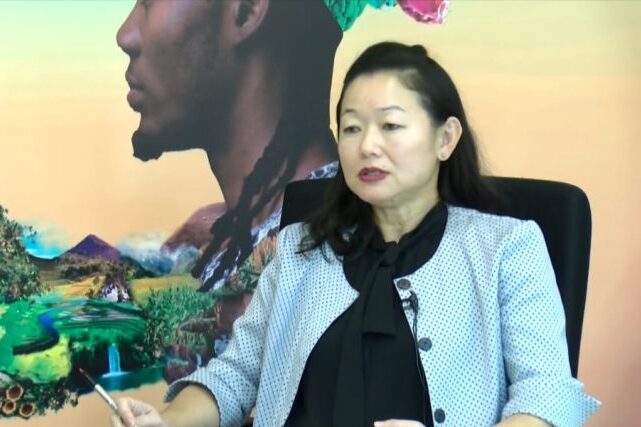Islamabad, Dec 1: According to World Food Program Country Director Coco Ushiyama, the WFP is working to guarantee that people have access to wholesome food in partnership with the government and other partners.
“The World Food Program (WFP) is working to address these challenges, focusing on food accessibility and affordability as part of its broader efforts to support the fundamental right to food,” she told APP in an interview. “Access to nutritious and affordable food remains a critical issue in Pakistan, especially in rural and underserved areas.”
Speaking further about the work of her organization, she stated that the foundation of WFP’s strategy is collaboration with institutions such as the Food and Agriculture Organization (FAO). WFP operates at both the policy and community levels, as does the International Fund for Agricultural Development (IFAD).
She added that WFP works with local governments to guarantee that people have access to safe, nourishing food at the community level and that this involves campaigning for improved social protection systems and participating in debates about nutrition and food security policies. According to her, the Benazir Nashonuma Program, a national campaign to combat stunting, is one of WFP’s main projects.
According to her, the WFP is witnessing encouraging results in addressing stunting and enhancing nutritional outcomes through this program, which integrates health and nutrition services to support mothers and children, particularly those under two.
According to her, WFP is also working on school meal programs and recently started a new project in Balochistan that gives pupils wholesome, locally sourced meals that promote their education and health. According to her, these meals help youngsters learn and stay in school, which promotes the long-term development of human capital.
WFP has decades of experience implementing school feeding programs in more than 100 countries. These programs work well to improve learning results, retention rates, and school attendance. Better nutrition and health have an impact that extends beyond education because they are directly related to a child’s capacity for concentration and academic success.
According to her, WFP guarantees a holistic approach to child development by combining school meals with larger health and hygiene initiatives. In certain areas, the program also helps local farmers by purchasing ingredients directly from them, establishing a sustainable food system and enhancing local economies.
By fortifying wheat flour, a mainstay in Pakistan, WFP is aiming to enhance food systems, according to Coco Ushiyama. WFP is also assisting in expanding the availability of fortified flour by collaborating with about 150 local wheat mills, some of which are operated by women. This effort has the potential to be significantly scaled up, ensuring that more people benefit from fortified diets, as there are almost 70,000 such mills nationwide.
According to her, WFP is working on livelihood initiatives that are suited to local requirements to further improve food security. These projects include helping communities with water problems and encouraging kitchen gardening, which enables households to produce their wholesome food. Another important component of WFP’s work is nutrition education, which she said helps individuals make educated decisions about eating a healthy diet.
In response to a query, she stated that nutrition is essential to the development of human capital and goes beyond health. She stated that to provide a better future for Pakistan, the World Food Program is attempting to enhance nutritional outcomes, especially for women and children. According to her, stunting, a disorder brought on by long-term malnutrition, affects both economic and physical growth.
According to WFP data, there is a $18 return on investment for every dollar invested on stunting prevention worldwide, thus addressing stunting is an investment in Pakistan’s future, she said. This endeavor is demonstrated by the Benazir Nashonuma Program, which strengthens social safety systems while providing needy individuals with nourishment and health services, she continued.
She stated that school meals are another essential component of WFP’s efforts in Pakistan and that data from more than 100 nations shows how successful these initiatives are in increasing school enrollment, attendance, and retention. According to her, WFP’s school meal programs in Pakistan give pupils access to at least one wholesome meal each day, which improves their concentration and academic performance.
According to her, every dollar spent on school meals can result in up to $9 in gains in human capital, making the return on investment substantial. According to her, WFP’s efforts highlight the link between nutrition, human capital development, and food security. WFP is paving the way for a better, more prosperous Pakistan by guaranteeing access to wholesome food via creative partnerships and programs. She came to the conclusion that these initiatives help to shape a better future for the nation by improving community resilience, economic opportunities, and educational outcomes.
